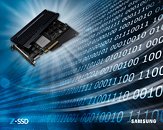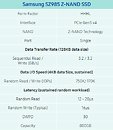Monday, November 20th 2017

Samsung's Z-NAND to Compete Favorably With Intel's Optane
As big data usage is becoming ubiquitous, and workload data-sets increase in both size and complexity, new ways of connecting processing resources to storage are being developed. Intel and Micron's partnership in developing 3D XPoint memory came as a way for computer systems to reduce their bottlenecks in storing data for processing, with a particular emphasis on reducing latency. Samsung, however, has enough resources to try and provide alternatives for the emergent market needs, and being one of the most important players in the NAND industry, it seems the company is betting on the Z-NAND wagon.
For now, Z-NAND as it is being developed by Samsung, is expected to be a new rendition of SLC (Single-Level Cell) NAND, with increased controller tweaks and improvements to achieve greater IOPS in both random and sequential workloads. SLC has already been widely used in the SSD market, though in recent years it has been giving way to density-oriented technologies, such as MLC and, more recently, TLC NAND, in an effort to lower the $/GB equation. Z-NAND is a return to the SLC roots, with some very relevant tricks up its sleeve - while 3D XPoint's call to fame was sometimes up to 10x lower latency (in the order of 10/10μs), Z-NAND is also bringing latency to levels hitherto unknown to NAND memory - specifically, to the 12-20/16μs realms.Comparing Intel's 750 GB Optane P4800X with Samsung's upcoming 800GB, SZ985, Z-NAND based solution, Samsung's drive delivers higher random read IOPS than Intel's Optane (750K vs 550K), but falls short on write IOPS (175K vs the same 550K for Optane). R/W bandwidth, however, seems to be in Z-NAND's favor: it delivers 3.2 GB/s in both metrics, while the Optane P4800X makes do with 2.4 GB/s and 2 GB/s, respectively, while endurance between both technologies should be equivalent.
Sources:
Samsung Z-NAND PDF, via The Register
For now, Z-NAND as it is being developed by Samsung, is expected to be a new rendition of SLC (Single-Level Cell) NAND, with increased controller tweaks and improvements to achieve greater IOPS in both random and sequential workloads. SLC has already been widely used in the SSD market, though in recent years it has been giving way to density-oriented technologies, such as MLC and, more recently, TLC NAND, in an effort to lower the $/GB equation. Z-NAND is a return to the SLC roots, with some very relevant tricks up its sleeve - while 3D XPoint's call to fame was sometimes up to 10x lower latency (in the order of 10/10μs), Z-NAND is also bringing latency to levels hitherto unknown to NAND memory - specifically, to the 12-20/16μs realms.Comparing Intel's 750 GB Optane P4800X with Samsung's upcoming 800GB, SZ985, Z-NAND based solution, Samsung's drive delivers higher random read IOPS than Intel's Optane (750K vs 550K), but falls short on write IOPS (175K vs the same 550K for Optane). R/W bandwidth, however, seems to be in Z-NAND's favor: it delivers 3.2 GB/s in both metrics, while the Optane P4800X makes do with 2.4 GB/s and 2 GB/s, respectively, while endurance between both technologies should be equivalent.


27 Comments on Samsung's Z-NAND to Compete Favorably With Intel's Optane
That's where Optane excels.
Optane-drives does not need capacitors at all though, so you get more benefits using Optane instead of capacitors right?
Basically for tasks that aren't all that read/write latency sensitive, you will be hard pressed in noticing impressionable difference between the two drives I mentioned, or any top of the line NVMe drive for that matter.
And we don know latency is felt, because SSDs don't do so well at QD1.
This can be partly mitigated by keeping/sparing more of the drive for over provisioning.
Hint ~ try hdtune, maybe that'll answer your query.
There are obvious differences, I promise you.
It would help if you could tell us you what you do on the 4800x & 750, nothing specific but perhaps the same application & same workload?
I notice the increased zippyness constantly.
Plus, I'm not even sure why you're trying to tell Nokiron, the only guy here who has actually experienced Optane, that he's not seeing any benefits.
He's not the only one, I believe StrayKat also has one btw confirmation bias? That's why I asked about what kind of work he was doing on Optane & whether that had to do with his better experience. I also said that the best NVMe drives (960 Pro/Evo?) shouldn't feel all that much different from Optane for a regular desktop user, enterprise work(load) could gain a lot more.
I also stand by my assumption that in a blind test 90% won't feel much of a difference between the two, if at all, maybe we can agree to disagree on that?